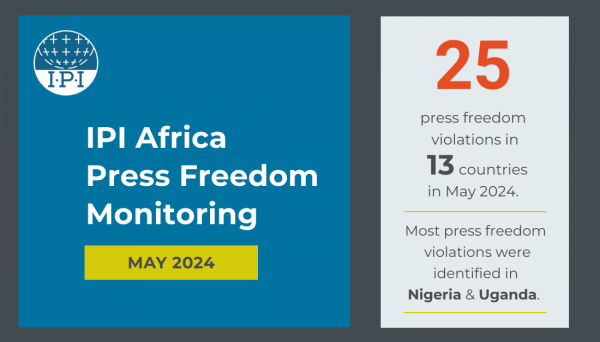Ugandan authorities must investigate attacks, including by security forces, against journalists attempting to cover the “Walk to Work” demonstrations and the ensuing violence that erupted last month, the director of the International Press Institute (IPI) said today.
According to reports from local media and the Human Rights Network for Journalists-Uganda (HRNJ-Uganda), a Kampala-based free press group, numerous reporters, photographers and camera people were attacked and beaten while trying to cover demonstrations by activists and opposition members that began on 11 April, and the violent protests in several cities that followed the injury and detention of opposition leaders.
Activists and citizens were protesting the rising cost of fuel and staple foods.
“While apologies from security forces for some of the violence are welcome, what is necessary is an investigation into the reported attacks against members of the media,” said IPI Director Alison Bethel McKenzie. “Journalists safety while they are on the job should be protected by security forces, not compromised. Those who have illegally harmed reporters or tried to prevent them from doing their jobs should be prosecuted.”
At least eight journalists had been attacked in demonstrations around the country by 14 April, according to HRNJ-Uganda. Most of the journalists told the group they had been wearing proper identification when attacked.
On 29 April, the Daily Monitor’s Jinja town correspondent Denis Edema was roughed up by security personnel, who destroyed pictures he had taken of protests there, and destroyed a memory card reader, according to a report in the newspaper that was also confirmed by the Daily Monitor’s executive editor, David Ssepuuya.
Television journalist Williams Ntege was arrested by anti-riot police in early May in Kampala, after he disobeyed an order to stop filming the arrest of a member of parliament, HRNJ-Uganda said. Ntege’s footage was reportedly erased and other tapes confiscated, and Ntege told the press freedom group that one plain-clothes police officer threatened to “shoot him on accusations that he was inciting violence.”
On 2 May, a journalist with Radio Simba, Christine Nabatanzi, was shot in the leg with a rubber bullet while covering the release of one opposition MP who had spent two weeks in jail for allegedly inciting violence in connection with the protests. She was shot while running from the authorities, who were dispersing protesters, she told HRNJ-Uganda.
“[We] are concerned about the situations in Uganda on areas namely; the safety and security of journalists especially front line journalists (photo journalists, radio reporters who rely news live and camera persons),” HRNJ-Uganda said in an emailed statement to IPI on 29 April. “These groups are targeted by security forces to be stopped from documenting brutal attacks on civilians. Such attacks on journalists continue to occur whenever there’s a demonstration in any party of the country.”
“A free press is part of the democratic dispensation which Ugandans should be enjoying, and taking away freedom of expression is a big dent on our democratic credentials,” Ssepuuya told IPI.
Harassment and attacks against reporters are common in Uganda, and several incidents were reported by news sources and press freedom groups in the run-up to February’s general elections. But Ssepuuya told IPI that with the recent demonstrations there has been more violence than usual, and that “we need to take a little more care.”


